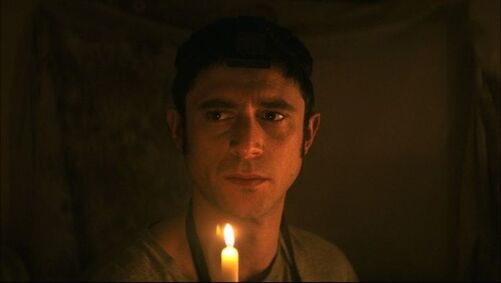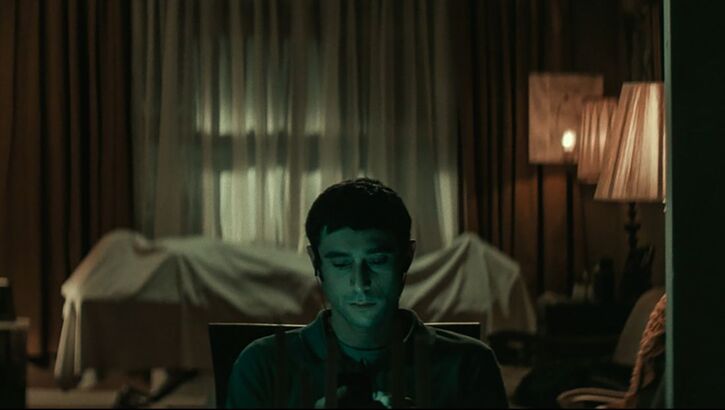[Review] 'The Vigil' is a Small Treasure of Cultural Knowledge Heavy on Dread and Claustrophobia7/31/2020  If there’s one thing I find too oft overlooked about the power of filmmaking, it’s the medium’s capacity for education... ...When I walk away from a film fully entertained, it’s a gift. When I walk away having learned something I didn’t know before, I feel genuinely blessed, and writer/director Keith Thomas’ The Vigil is one such blessing. It is, in fact, a small treasure of cultural knowledge. The Vigil follows Yakov (Dave Davis), a recent defect from the Hasidic Jewish community of Brooklyn’s Borough Park, as he navigates a terrifying night acting as shomer (guardian) for recently deceased Holocaust survivor Mr. Litvak (Ronald Cohen). The somber festivities kick off with Yakov attending a group meeting for defectors and those considering defecting from the Hasidic community. The group share their struggles acclimating to life on their own terms, and Yakov confesses his foremost concern is his financial trouble; he even recounts a failed job interview and his hurried attempt to produce a hand-written resume. Upon leaving the meeting Yakov is set upon by his cousin Shulem (Menashe Lustig) who, using his knowledge of Yakov’s finances and a soupçon of guilt, convinces him to step in as a paid shomer to Mr. Litvak. What follows is a nightmarish example of the Jewish practice of Shemira, which roughly means “watching or guarding”. The practice involves shomrim (guardians), referred to as shomer (male) and shomeret (female), who watch over the body of the recently deceased from the time of their passing until the time of their burial. Often the shomrim are family, but it can be a paid service in some instances. Traditionally it was a means to prevent the desecration of the body by pests and scavengers and to aid the spirit on its journey. The shomrim are tasked with reciting soothing psalms and passages while watching over the departed to comfort their confused spirit, believed to remain near the body for anywhere from three to seven days after death. The film doesn’t hold your hand through the cultural intricacies, but the bare bones explanation of the Shemira in the opening is a smart and necessary touch for including viewers unfamiliar with the practice. Once Yakov agrees to his cousin’s proposition the film stays—with the exception of a brief yet bone rattling (or crunching) scene—in the Litvak residence. This isolation allows Thomas to show his prowess with one of my favorite cinematic stunts: the single location. The house is dim, every corner and pitch doorway a portal into the void. If that weren’t enough, the shrouded body placed prominently in the living room, news of the previous shomer fleeing citing “concerns”, and the immediate and negative reaction of Mrs. Litvak (Lynn Cohen) to Yakov should have had him running for the door. But alas, Yakov is too desperate for money to turn it down, and wasn’t that exactly what Shulem was counting on? Resigned, Yakov settles in for the evening, his back to Mr. Litvak and headphones in his ears, but it doesn’t take long before phantom movements, unnatural sounds, and startling appearances from Mrs. Litvak dissolve any peace he might have found in his duties. The Vigil sits neatly on a fault line between The Conjuring and The Autopsy of Jane Doe, leaning on the dread and lore of the former and the claustrophobia of the latter. The body of Mr. Litvak looms stark and heavy in the frame, simultaneously daring both Yakov and the audience to look away and boldly reminding us that we cannot. The Vigil forgoes buckets of blood for metric tons of atmosphere; nearly every inch of the Litvak home poses a potential threat, offering every ghost and ghoul a corner in which to go bump. Cinematographer Zach Kuperstein and composer Michael Yezerski deserve credit for doing a great amount of the heavy lifting here. The camera work and framing are beasts in their own right, and Yezerski’s pulsing score gives each its own ragged heartbeat. The considerable strength of Davis and Cohen’s abilities provide a sufficient anchor for the film, despite its lean script. Davis’ soft command keeps us rooted in Yakov’s vulnerability and suffering in the wake of his much younger brother’s death—the event we come to understand as catalyst for his crisis of faith and exit from the Hasidic community. Cohen is effective as the widow wrapped in an air of mysticism and stumbling in and out of sleep and dementia. Another interesting thing The Vigil toys with is the concept of survivor’s guilt as a malignant manifestation and the idea of inherited trauma, whether culturally, biologically, or both. These topics seem to be of particular interest and importance when viewed through the historical lens of Judaism and the Jewish people. It’s refreshing to see Judaism take its rightful turn under the dark light of religious horror. Where Christianity—and in particular Roman Catholicism—have become genre tropes, The Vigil offers a fresh perspective. While The Vigil doesn’t exactly tear down any walls or break new ground, it does lay down solid footholds for things that may. It’s a strong feature debut from Thomas, and a shining high point amongst Blumhouse’s catalogue. My only lament is not having been able to see it on the big screen. The Vigil is now available in UK and Irish cinemas from Vertigo Releasing and Blumhouse. By Paul Bauer
0 Comments
Leave a Reply. |
Archives
March 2023
|


 RSS Feed
RSS Feed